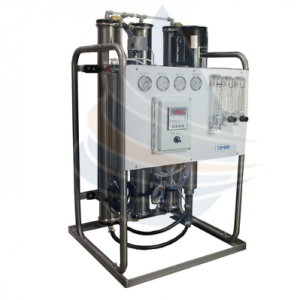| RainDance Water Systems |

| Registration Date | 14 Aug 2023 |
| Revision Date | 14 Aug 2023 |
| Share |
Environment Water and Wastewater
Water Treatment System
Nanofiltration is a liquid separation membrane technology positioned between reverse osmosis (RO) and ultrafiltration (UF). A nanofiltration filter has a pore size around 0.001 micron. Nano Membranes provide high productivity performance while reducing a high percentage of salts, nitrate, and organic compounds such as pesticides, herbicides and THM precursors. The low net driving pressure NF membrane allows the removal of these compounds at low operating pressures. NF also removes hardness from water, which accounts for NF membranes sometimes being called “softening membranes” – NF is an attractive alternative to lime softening or zeolite salt regenerating type softening technologies.
✔ Reduces salts & total dissolved solids (TDS)
✔ Reduces sodium & chloride
✔ Reduces heavy metals
✔ Reduces pesticides, herbicides, insecticides
✔ Reduces nitrates & sulfates
✔ Reduces uranium & radium
✔ Reduces fluoride
✔ Reduces color, tannins, and turbidity
✔ Softens hard water (calcium & magnesium minerals) without salt
✔ Filters bacteria, viruses, giardia, cryptosporidium, cysts
✔ Filters well water sediment, rust, organic chemicals
✔ Filters city treated water sediment, rust, chlorine, chloramines, organic chemicals
Nano filtration water treatment is much the same as reverse osmosis technology. The key difference is the lower rejection levels - nano filtration is used where the high purity of reverse osmosis is not necessary. Reverse osmosis systems remove up to 99% of dissolved minerals whereas the nano membrane removes only around 80-90% (nominal) of dissolved minerals. This means that the softened filtered water contains a partial mineral content which provides a good mineral taste while filtering excessive hardness, chemicals, nitrates, sulfates, pesticides, insecticides, and off taste components. Our Nano filtration systems offer a cost-effective alternative to commercial & light commercial reverse osmosis units, as nano filtration systems can be operated at lower operating pressures and typically do not require the addition of a separate water softener. The level of dissolved solids to be removed is less than what is typically encountered in brackish water or seawater. As such, nano filtration is especially well-suited for treatment of municipal city tap water, well water, or water from surface sources like rivers and lakes.